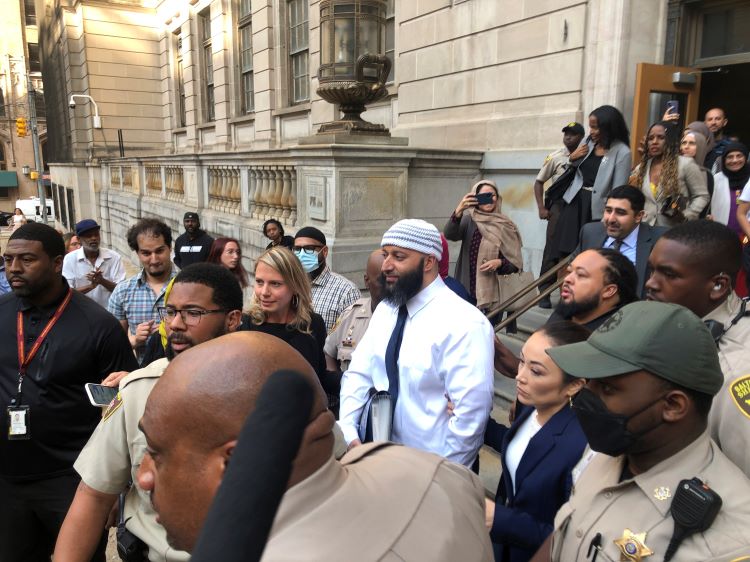A Credit to the Genre: 'Serial' and the case of Adnan Syed

Adnan Syed, center, leaves the courthouse Sept. 19 in Baltimore. A judge ordered the release of Syed after overturning his conviction for a 1999 murder that was chronicled in the Serial podcast. Photo by Brian Witte/The Associated Press; adjacent photo by Casey Fiesler/Flickr.
Back in 2019, I wrote an installment for this column discussing whether true-crime documentaries can do more harm than good for the criminal justice system. In that piece, I focused squarely on the Netflix documentary series Making a Murderer. I spoke with a reporter who had covered the trial and received his feedback regarding what was actually included in the series and what was left out. I referred to that editorial practice as the “CliffsNotes version.”
Additionally, I spoke with an attorney (who requested anonymity) associated with a then-recently televised true-crime documentary. He educated me on what I called the “agenda issue”—that filmmakers in this specific genre do not always create their work from an objective perspective.
Finally, I discussed the process with Amani Martin, director of episodes 5 through 7 of The Last Defense, a popular true-crime documentary. The Martin-directed episodes examined the trial and conviction of Julius Jones. We discussed the potential effect true-crime documentaries can have on the actual innocence claims of other inmates. It was insightful, but the potential consequences were very troubling. Sometimes true-crime shows can give those seeking assistance with actual innocence claims false expectations as to the outcome. Moreover, they can potentially lead to negative blowback from the public in some circumstances as well.
Recently though, I received a breath of fresh air concerning those fears.
 Related article from ABAJournal.com: “Judge orders new DNA tests in Adnan Syed murder case featured on ‘Serial’ podcast”
Related article from ABAJournal.com: “Judge orders new DNA tests in Adnan Syed murder case featured on ‘Serial’ podcast”
‘Serial’
Serial broke new ground when it aired in fall 2014 and expanded the medium by which true-crime stories were relayed to audiences. With its podcast format meant to be listened to chronologically, it quickly became a sensation, relaying the story of Adnan Syed, a young man convicted for the 1999 murder of his ex-high-school girlfriend, Hae Min Lee.
Hosted by journalist Sarah Koenig, the first season of Serial consists of 13 episodes, all of which focus on Syed’s case. With episode titles such as “The Alibi,” “Inconsistencies” and “Rumors,” it was clear the endeavor was to look past the surface facts and into possible issues surrounding the validity of the result.
The series currently boasts three seasons. The second season focused on an American soldier held captive by the Taliban for five years, only to eventually be charged with desertion and misbehavior before the enemy. Season 3 examined various cases within the Justice Center Complex in Cleveland.
Nevertheless, Serial will likely always be synonymous with Syed, if for no other reason than the attention it generated, possibly contributing to one of our generation’s greatest true-crime success stories.
The prosecution’s motion
It’s easy for the unaware to credit the series as a catalyst behind the prosecution’s decision to investigate issues involving newly discovered evidence and potential Brady violations during Syed’s trial. After all, that first season has garnered more than 300 million downloads, making it arguably the most listened-to podcast in the world.
However, Syed began fighting his conviction long before his case was publicized. In 2010, he filed a petition for post-conviction relief with the Circuit Court alleging ineffective assistance of trial, sentencing, and appellate counsel. The petition was denied on all grounds in 2014, but Syed applied for leave to appeal. Upon remand, he raised a purported Brady violation concerning cell tower location evidence and an additional claim of ineffective assistance of counsel for failure to investigate a potential alibi witness.
In 2016, the Circuit Court vacated Syed’s convictions and granted a new trial based on the Brady claim but denied the ineffective assistance of counsel grounds. However, the prosecution appealed that ruling, which ultimately resulted in the Court of Special Appeals reversing the Circuit Court on both grounds in 2018. It held the Brady claim did not require a new trial (it was waived) but the failure to investigate an alibi witness did.
Nevertheless, in 2019, the Court of Appeals reversed the Court of Special Appeals’ decision and held that the potential alibi witness’s testimony did not necessitate a new trial. The Court agreed that the Brady violation issue was waived. The U.S. Supreme Court denied Syed’s petition for certiorari later that year.
This brings us to 2022 and Syed’s release from prison. It would be unfounded for anyone to argue the Serial podcast was the sole reason. Still, the fact that his case was analyzed and dissected in such detail, leading to millions of individuals’ investment in his plight for innocence, can’t be overstated.
The judge’s order
On Sept. 19, the culmination of the true-crime-inspired investigation came to fruition, as Baltimore City Circuit Judge Melissa Phinn overturned Syed’s conviction, holding the prosecution made a compelling argument that the convictions in question were flawed and should be overturned. This result was based on trial prosecutors failing to turn over evidence to the defense which could have been exculpatory. That evidence could have aided the defense in moving forward with a strong SODDI (some other dude did it) defense.
Moreover, the court found that evidence discovered subsequent to the trial showed a “substantial and significant probability that the result [of the criminal trial] would have been different.” Consequently, Judge Phinn vacated Syed’s convictions for murder, kidnapping, robbery and false imprisonment. She released Syed without bail to home confinement and GPS monitoring, and ordered the prosecution to decide by October 19 whether it would seek a new trial or dismiss the case outright.
(Sadly, I could not find a copy of any written order detailing the court’s findings of fact and conclusions of law. If anyone has a copy of the order, feel free to email it my way, as I’m interested in seeing it).
The final decision
The drama of Syed’s case continued. Less than two weeks after Judge Phinn’s order vacating his convictions, the decedent’s family announced their intentions to appeal the Judge’s ruling.
Young Lee, the decedent’s brother, filed a notice of appeal alleging a violation of his “family’s right to meaningfully participate in the Sept. 19 hearing” which secured Syed’s release. While I haven’t seen the notice of appeal, and it is somewhat odd for a nonparty to intervene and attempt to appeal a criminal matter, Maryland (like my home state of Oklahoma and many others) has codified “victims’ rights” into its constitution.
As an aside, I have written against victims’ rights legislation such as Marsy’s Law, which Oklahoma codified in 2018. Victims should not be entitled to special rights; they already have a plethora of constitutional rights at their disposal simply based on their status as humans, and their position, while extremely sympathetic, is in no way comparable to that of individuals facing the potential of state-sanctioned loss of life and liberty. That is why criminal defendants have certain “special” rights in court that victims don’t. Rant over.
Despite the family’s attempt to intervene, on Oct. 11, Baltimore City State’s Attorney Marilyn Mosby announced that recently tested DNA completely exculpated Syed from the crime, saying that he had spent 23 years in prison on a wrongful conviction. Mosby acknowledged the pain and trauma Lee’s family had suffered but emphasized the case against Syed was over.
At the end of the day, Adnan Syed’s sentence review was a win—not only for the true-crime genre but also for the criminal justice system as a whole.
See also:
ABAJournal.com: “Charges are dropped against Adnan Syed of ‘Serial’ podcast fame after further DNA tests”
ABAJournal.com: “Adnan Syed of ‘Serial’ podcast fame released to home detention after judge vacates murder conviction”
ABAJournal.com: “‘Alternative suspects,’ unreliable evidence support new trial for Adnan Syed of ‘Serial’ podcast fame, prosecutors say”
ABAJournal.com: “Top state court reinstates murder conviction of Adnan Syed; his case was chronicled in ‘Serial’ podcast”

Adam Banner
Adam R. Banner is the founder and lead attorney of the Oklahoma Legal Group, a criminal defense law firm in Oklahoma City. His practice focuses solely on state and federal criminal defense. He represents the accused against allegations of sex crimes, violent crimes, drug crimes and white-collar crimes.
The study of law isn’t for everyone, yet its practice and procedure seems to permeate pop culture at an increasing rate. This column is about the intersection of law and pop culture in an attempt to separate the real from the ridiculous.
This column reflects the opinions of the author and not necessarily the views of the ABA Journal—or the American Bar Association.



